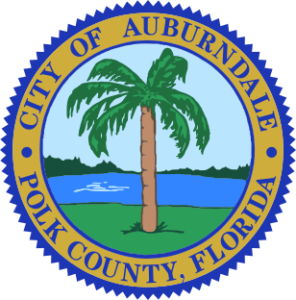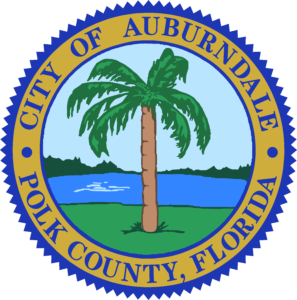Sergio Romero
Code Compliance Officer
(863) 968-5182
codeenforcement@auburndalefl.com
The Auburndale City Commission has adopted City Codes (laws) specifically designed to address blight, nuisances, dangerous conditions, and to maintain a clean and attractive environment for all citizens in our community. The City of Auburndale accomplishes this mission by working in partnership with the residents of Auburndale.
The mission of the Code Compliance office is to promote and maintain a safe and desirable living and working environment. We help maintain and improve the quality of life in our community by administering a fair and unbiased enforcement program to correct violations of municipal codes and land use requirements. We also work with residents, neighborhood associations, public service agencies and other city departments to:
- Facilitate voluntary compliance with City laws and codes.
- Empower community self-help programs.
- Develop public outreach programs.
- Establish community priorities for enforcement programs.
Below are the most common city ordinances affecting our community. If you would like to view the complete Code of Ordinances click here
Dogs & Cats
The Polk County Sheriff’s Office—Animal Control Division is designated as the enforcement agency for animal control within the city limits of Auburndale in accordance with Polk County Ordinance 10-001 as subsequently amended.
Noise Ordinance
For the current City of Auburndale Noise Control Ordinance click here.
Weeds, Trash & Rubbish
Nuisance:
On lots, parcels, or tracts of land not currently being used for agriculture purposes, any growth of weeds to more than a height of one (1) foot, or any rank vegetable growth which exhales unpleasant and noxious odors, or which may conceal filthy deposits, or harbor insects or any offensive matter or thing, or the accumulation of any undergrowth, debris, trash, rubbish or other unsanitary accumulation which is likely to affect the health and safety of the community, be and the same is hereby declared to be nuisance. Trees on these properties shall be pruned to maintain clear visibility in order to protect the health and safety of the community. See section 18.3.6 of the Land Development Regulations for applicable fire safety/spacing standards.
Failure to remove weeds and trash; penalty:
Any person who shall fail or refuse to remove any accumulation of weeds, rubbish or other unsanitary accumulation from any premises owned or occupied by them in the city after notice has been served on them to do so, either personally or in writing, for ten (10) days after receipt of such notice shall be punished as prescribed in section 1-11 of the Code.
Removal by city; costs a lien against property:
If the owner fails to clean up such premises, the city may proceed to clean up such premises and charge the same against the premises, together with an administration fee which from time to time will be set by the city commission. Said administrative fee shall include incidental costs of investigating and notifying owners of violations under Chapter 11, Article III, section 11-53. Such amount shall bear interest at the rate of twelve (12) percent per annum until the succeeding payment on such premises is due, at which time the bill for cleaning the same, plus administrative fee, shall be a lien on the property equal in dignity with the taxes enforceable in the same manner as is provided for the collection of delinquent taxes.
Preparation of trash for pickup:
Leaves, citrus droppings, grass clippings and small material must be bagged or boxed (cardboard) in a size easily handled by one (1) person. Trees, tree limbs, or similar materials must be cut to a length not to exceed sixty (60) inches. Material properly prepared for pickup will be placed at curbside in a manner to facilitate pickup and not in close proximity to utility poles, street signs, fire hydrants, etc.
Allowance for trash removal:
One (1) six-cubic-yard pickup of trash per week is allowed per residence or business. An accumulation of trash exceeding six (6) cubic yards per week shall be considered in excess of the normal amount of trash generated by a residence or business. Such excessive accumulations, if prepared and placed at curbside as herein provided, will be removed by the city and charged a rate set by the city commission.
Tires and appliances not included in trash:
Tires and appliances must be separated from trash and an additional pickup fee set by the city commission will be charged for these items.
Vehicles
Definitions:
The following definitions shall apply in the interpretation and enforcement of this article:
Property shall mean any real property within the city which is not a street or highway.
Street or highway shall mean the entire width between the boundary lines of every way publicly maintained where any part thereof is open to the public for purpose of vehicular travel.
Vehicle shall mean a machine propelled by power other than human power designed to travel along the ground by use of wheels, treads, runners or slides and to transport persons or property or pull machinery and shall include, without limitation, automobile, truck, trailer, motorcycle, tractor, buggy and wagon. Vehicle shall also include boats ten (10) feet or longer.
Abandonment of vehicles prohibited; prima facie evidence:
(a) No person shall abandon any vehicle within the city and no person shall have any vehicle at any place within the city for such time and under such circumstances as to cause such vehicle reasonably to appear to have been abandoned.
(b) The absence of a license plate for the current year or the absence of a current vehicle registration shall be prima facie evidence that such vehicle is abandoned, junked or discarded. The presence of a current license plate or registration shall not, in and of itself, exempt any vehicle from the provisions of this article.
Leaving of wrecked nonoperating vehicle on street or highway:
No person shall leave any licensed or unlicensed partially dismantled, nonoperating, wrecked, or junked vehicle on any street, highway or public way within the city.
Disposition of wrecked, discarded or nonoperating vehicles on private property:
(a) No person in charge of any property within the city, whether as owner, tenant, occupant, lessee or otherwise, shall allow any partially dismantled, nonoperating, wrecked, junked or discarded vehicle to remain on such property longer than ten (10) days. No person shall leave any such vehicle on any property within the city for a longer time than ten (10) days.
(b) This section shall not apply with regard to a vehicle in an enclosed building; a vehicle on the premises of a business enterprise operated in a lawful place and manner, and for which a city license shall have been issued when necessary to the operation of such business enterprise; or a vehicle in an appropriate storage place or depository maintained in a lawful place and manner by the city.
Notice to owner:
It shall be the duty of the police chief or his designee, to give written notice to the registered owner of any vehicle which is in violation of this article, or to give such notice to the owner, lessee or person in possession of the private land whereon such vehicle is situated where the identity of the registered owner is not readily ascertainable, advising such person that such vehicle violates this article and demanding that such vehicle be removed from the city within seventy-two (72) hours or that within seventy-two (72) hours it be housed in an enclosed building where it will not be visible from the street or that such vehicle be repaired within seventy-two (72) hours to such an extent that it is not in violation of this article by virtue of being dismantled, partially dismantled, wrecked, junked or nonoperating. Such notice may be given by personal service, by registered mail, or by posting of the notice in a conspicuous place on the vehicle.
Removal by city; assessment of costs:
If the vehicle is not removed from the city, suitably housed, or moved to the premises of a business enterprise licensed to receive such vehicles within seventy-two (72) hours from the giving of notice under section 13-20, the police chief or his designee may have the vehicle removed from the city and assess the cost of such removal against the owner either as a lien against the vehicle or as an addition to any fine to which the owner may be subjected.
Maintenance of junkyards prohibited:
No persons may maintain any junkyard for the storage, display, dismantling or sale of wrecked, dismantled, partially dismantled or nonoperating vehicles or appliances in the city nor shall any person use or maintain any real property in the city in such a manner as to give it the appearance of a junkyard or similar establishment.
Major repair work in residential areas prohibited:
No person may perform or conduct any major repair work on vehicles, such as body repairing, painting, engine overhaul, transmission or differential disassembly and reassembly or brake shoe replacement in any residential area within the city; with the exception that a person may work on his own vehicle on private property for emergency repair work.
Parking
Violations; notices; penalties; restitution:
(a) The city manager is hereby authorized to prohibit, limit or impose restrictions upon the use of on-street parking. He is further authorized to place signs and to paint curbs warning motorists of such restrictions.
(b) The following penalties for parking violations are hereby established:
Violation Fine
Parking violations established by Chapter 316, Florida Statutes . . . $10.00
Unauthorized use of handicapped parking space . . . $100.00
Any truck or trailer, rated over one (1) ton by the manufacturer, parked on a public right-of-way within a residentially zoned area . . . $25.00
(c) All penalties provided for in this chapter shall be paid in full within ten (10) calendar days from the date of the violation. An additional fine of five dollars ($5.00) shall be added to the penalties provided for in this chapter for failure to pay within the time prescribed by this section.
(d) If the registered owner or owners of a motor vehicle on which a parking violation notice has been affixed by a police officer or parking enforcement officer of the city shall fail to pay the penalty as provided in this section within twenty (20) days from the date of the violation, such person may be prosecuted for the noncriminal violation as provided in Section 316.1967, Florida Statutes. A failure to pay as provided in Section 316.1967, Florida Statutes, shall result in the suspension of the offender’s drivers license.


